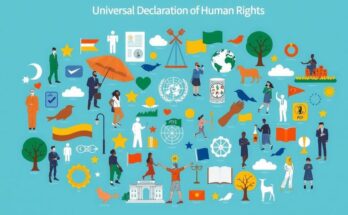Signs of Hope Amidst Turmoil in Asia
In 2024, Human Rights Watch (HRW) revealed a flicker of hope for democracy and human rights in the Asia-Pacific region amid persistent challenges. Their World Report 2025 celebrated notable citizen responses such as Indian voters standing up to Prime Minister Narendra Modi, students pushing out Bangladeshi PM Sheikh Hasina, and public protests in South Korea that thwarted martial law attempts by President Yoon Suk Yeol.
Challenges in Myanmar and Women’s Rights in Afghanistan
However, the light of progress contrasts with dark realities elsewhere. In Myanmar, the military junta remains ruthless, executing bombings and imprisoning opponents nearly four years post-coup. Furthermore, in Afghanistan, the Taliban have rolled back rights, restricting women’s freedoms and erasing years of advancement. Economic woes have fueled further repression, eclipsing the positive endeavors in neighboring countries.
Bangladesh’s Political Shift
In a significant shift, Prime Minister Hasina was forced out during widespread protests, leading to violence that left thousands dead, including children. Following this upheaval, Nobel laureate Muhammad Yunus stepped in as interim leader, focusing on accountability and restoring order, inviting UN oversight to address protest-related abuses. This political turnaround signals an important step towards restoring democracy in Bangladesh.
Democratic Resilience in India and South Korea
In India, voters rejected Modi’s divisive politics, reflecting the resilience of democracy as they denied him an outright majority. This movement underscores the power of collective action against oppression, as HRW’s Tirana Hassan described. In South Korea, martial law backfired spectacularly, with citizens rallying to restore democracy, a reminder of ordinary people’s strength in demanding rights.
Repression in China and Hong Kong
Conversely, HRW documented deepening oppression in Xi Jinping’s China, with severe crackdowns on civil liberties and dissent. Hong Kong witnessed further erosion of freedoms as activists faced harsh penalties for their opposition. With an increasing number of detentions tied to dissent, the authoritarian grip continues to tighten, stifling freedoms and rights in the region.
The Deterioration of Women’s Rights in Afghanistan
Afghanistan’s women and girls faced significant setbacks under the Taliban’s regressive laws, which severely restricted their freedoms and requirements for public behavior. New laws enforced rigid dress codes and limited women’s ability to engage in society, illustrating a stark reversal in rights that were hard-fought over the past decades.
Continued Violations in Myanmar and Southeast Asia
HRW described ongoing atrocities in Myanmar, with military actions devastating civilian areas. While there were moves toward accountability with an ICC arrest warrant for the junta leader, inconsistencies hinder the delivery of justice. In Southeast Asia, Singapore’s death penalty practices persist, and the democracy issues in Thailand linger as its government struggles to address human rights effectively, despite a notable advancement in recognizing same-sex marriage.
HRW’s 2025 Report highlights mixed signals in the Asia-Pacific: citizen movements in India, Bangladesh, and South Korea show progress, while Myanmar and Afghanistan exhibit ongoing repression. The report emphasizes that when rights are protected, progress flourishes; when denied, the cost is human lives. Accountability efforts emerge in Bangladesh, yet severe restrictions persist in China and Afghanistan.
While the Asia-Pacific region faced tremendous struggles for human rights and democracy, there are glimmers of hope. Grassroots movements in India, Bangladesh, and South Korea exemplify the power of collective action against oppression. Yet, challenges remain poignant in Myanmar, Afghanistan, and China, where authoritarian regimes continue to suppress progress, highlighting the urgent need for sustained focus on human rights advocacy.
Original Source: www.voanews.com



